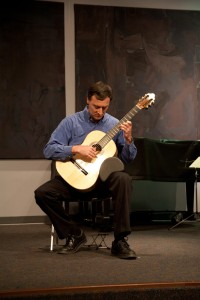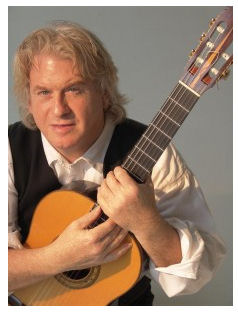The following is a recent post on the DelCamp Classical Guitar Forum in response some threads on Performance Anxiety. This was a response to using beta blockers and other ideas for helping with PA. Seems there might be interest in another PAR Workshop this fall (moved up from next Spring). If you want to keep posted please SUBSCRIBE.
I’m not a big fan of beta-blockers. I dabbled in these for a while on a very small dose. I found (and others who admitted to have taken them), memory to be an issue. I was relaxed, maybe too relaxed and a little ‘numb’ and a bit forgetful. It was a funny trade-off; be relaxed but manifest a performer’s top fear: forgetting the music.
I think performance anxiety (nerves) and the physical manifestation of such can be dealt with two ways. Performance anxiety (and your good suggestions of breathing, letting go), etc. are best done in practice. Doing them just before a performance won’t be as effective as practicing these concepts into a piece, (if that is what you’re suggesting). I teach a Performance Anxiety Rehab Workshop and we’ve come up with a fun pneumonic: B.L.I.S.S. which stands for Breath, Listen/Let Go, Integrate*, Slow, SLOW.
Even with all those skills working for a player the negative affects associated with nerves, (shaking hands especially), can just show up. My students are well trained to kick into the BLISS mode to alleviate them. One of my CGI students last year finished the first set of the student recital with the [em]Allegro[/em] from [em]La Catedral[/em]. After the concert he told me that despite playing well he felt out of control, that his left hand began to shake, which was odd for him. Now he wasn’t originally planning on playing this work but it fit so well for the program that I persuaded him to, even though it wasn’t quite up to tempo when he arrived. (He’d been doing what I suggested; SLOW PRACTICE.) So he brought it up to tempo and did a fantastic job. In fact, certain passages he’d never played better. I then asked him when he had ever seen a player of anycaliber that piece as his or her first piece!
But back to his shaking hand. He said he just started to breath, let go, listen, slow the piece a bit and things went better than he felt! I reminded him that had he not practiced these techniques consistently they would not be so readily at his disposal and his performance could have easily gone the other way. (You know, the one we all dread.) Another student performed the Valse, Opus 8, (opened the concert) and had the same experience (right hand shaking) with the same wonderful results.
Regarding breathing; I learned that when we take a deep breath a nerve that runs from the base of the brain to the stomach stimulates the outer wall of the stomach which contains seratonin. The seratonim then travels back up to the brain, disengages the fight or flight orders resulting in a slowing of the heart beat and ultimately the breadth.
I submit that when we are in this relaxed state that we better access the good learning we’ve embedded in our myelin (the memory around the nerves), and the more we can recall. In David Brooks’ book The Social Animal the author states that: When a beginner learns a task, there is a vast sprawl of brain activity. When an expert does it unconsciously, there is just a little pulse. The expert is performing better by thinking less. When she’s at the top of her game the automatic centers of her brain are controlling her movements.
He also states that the conscious part of the brain is capable of processing about 40 bits of information a minute. The sub (or ‘adaptive’) part of the brain about 200,000 per minute. Think of them as processors. I ask students, in crunch time, which processor do you want working for you. When we realize this we come to understand the importance of focus in practice.
I teach students to first train or practice (input) and then work on relying on that training in performance (output). If the training is good and the performance skills are learned the player has the ability to tap into that bigger processor and the output can closely match the input. Or as Tim Galloway puts it in his book The Inner Game of Music, “Performance = potential – interference”.
So when I catch my mind wandering in practice I bring it back to the directive at hand, knowing that every minute I’m practicing I’m laying the foundation for performance.
*The Integration refers to performance practice directives taught in the workshop. But those unfamiliar with my workshops can certainly do the others with good results.
Please let me know your thoughts and experiences!









BLISS works for me. It’s simple. It’s easy to remember. Personally, I think the listening part is more important than the breathing, but both are good. And most important for me, every time I perform, it gets easier.
Is “muscle memory” part of the sub/adaptive brain or something else? It seems that as much as we say that we don’t want to rely on muscle memory, in fact we must. And we should be working on things (e.g. BLISS) to keep the conscious mind from mucking things up.
Charlie -I like David Brooks’ quote up above where he states that eventually this muscle memory becomes fluid and requires very little effort. So yes, we rely on muscle memory, especially at first, but eventually, (as the myelin wraps those nerve endings more and more), they become natural – but only if we apply something like BLISS. Relying more heavily on muscle memory initially is the ‘input’ I’m talking about while later, as we have trained, the output can be much easier, especially if we don’t ‘try’.
A player will often get better with a piece and think all they have to do to continue is to practice they same way and the piece will continue to get better. Nope, new ideas have to be introduced and more along the lines of letting go and the other practice directives that we apply, (dotted rhythms, vibrato), and eventually the performance practice (BLISS, etc).
Funny that you happen to post an acticle about performance anxiety, B.L.I.S.S., and the use of Beta Blockers etc. I had a 30 minute recitial at a book store last week and I almost emailed Scott before hand because I was so nervous, I could hardly think. I’m not sure what words of wisdom I was looking for because I had just learned many skills durng the recent “Guitar Immersion” and two hours before the perforance was cerainly no time to build-up skills I could have been using for weeks now. Instead, I used a Beta Blocker as I always do and mananged to do the performance with resonable sucess… I now find myself in the same boat. I will be performing a 20 minute set during intermission at a play this Saturday. Today is Thursday and I can already feel the anxiety beginning to build…. There is a point to all this rambling. I think I need to find the courage to really practice the skills and deal with my performance anxiety demons. I sometimes think because I’m a naturally anxious person, the hill is to hard to climb, the battle to much to fight. So I give in to the quick and easy path. I do know I love playing and performing on the classical guitar and am not willing to give it up …. I don’t know, maybe I can practice the skills and find the “balls” to perform without enhancement at the up coming “Art Walk” I’ll be performing at. I have a whole month to practice my B.L.I.S.S.
Teresa,
Okay, let’s climb down from the ladder and take a breadth.
I know this seems like life and death but its not. Please define what the worst thing that could happen could be. A memory slip, something that would cause you not to finish the piece. And if it happened, what would you do, what would happen to you? Yes, you’d be embarrassed, disappointed, etc. But really would you lose those close to you? Would it negatively affect the good things in your life? Would you, after a period of being a bit down in the dumps, eventually get back on the horse and practice harder?
Okay, if you can live with the worst lets proceed. Now, how many performances have you given where what I just described has taken place. Does it happen most of the time? Does it happen 60%, 50, 30% of the time? Seeing you perform in Portland I’d bet has never happened and if it has it more like 10%. So, if that’s the case then why are you spending 90% of your energy worrying about something that has a remote chance of happening?
Now – do a series of practice performances tomorrow or tonight. Sit down in front of someone and attempt the BLISS concept (or whatever you did at CGI to do so well). Do it two or three times. If you’d like videotape one of these performances and watch it. I think you’ll be impressed.
Plunk around on the guitar Saturday, no real big practice necessary. Between now and then, every time you get nervous, take a four count breath in, hold for 4, release for 4 and hold for 4.
Keep us posted
Thanks!!! What would you like me to elaborate on? Any specific questions? Always happy to answer!!!
Scott